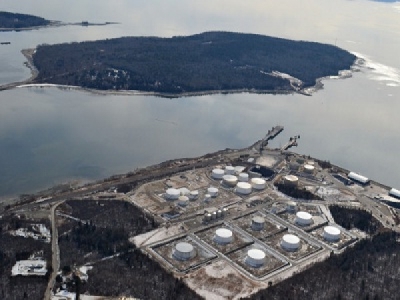
Posted on April 24, 2017
A $3 million dredging project and a $6.4 million upgrade to the port of Searsport are on the Maine Department of Transportation work plan for 2018 and 2019.
The Dredge Report
The planned dredging project would not expand the shipping channel or shipping berths at Mack Point in Searsport. The plan is to dig out the existing shipping channel and ship turning area that has silted in over the years so that some ships are only able to offload at high tide. The area has not been dredged for 53 years, according to Searsport Town Manager James Gillway.
Strong local opposition in recent years to a proposal to expand the dredged area at the port centered around concerns about potential environmental impacts near the dredging site and at proposed dredge spoil dumping sites in Penobscot Bay.
One of the target dump sites was near Islesboro.
Residents and lobster fishermen from nearby towns and islands and from the other side of Penobscot Bay raised concerns that the expanded dredge project would release chemical toxins that have been locked up in bottom sediments for decades. Mercury, a known neurotoxin, and other heavy metals related to industrial use on the Penobscot River have been found in sediments and in higher-than-normal levels in lobsters and crabs at the head of the Bay.
Last year, the crab and lobster fishing area above Fort Point was closed as a result.
Dumping dredge spoils into the bay might also create a physical problem by suspending sediments in the water, resulting in damage to lobsters and other marine life.
At the request of Maine DOT, an environmental engineering firm conducted research on alternative disposal sites, including beneficial ways the dredge spoils could be used on land.
An option for disposal favored by the DOT is to use the dredge material as fill at Mack Point, then capping the site. Maine DOT has shared that and other disposal options with the U.S. Army Corps of Engineers (USACE), the federal agency ultimately responsible for the dredging project.
The maintenence dredge will be paid for with federal funds.
A proposal to expand the dredged area will be back in the future, according to Jonathon Nass, Deputy Commissioner of the Maine DOT.
“The port needs to be upgraded,” said Nass.
Gillway agreed.
“There is never going to be enough room there for super ships. It’s a very tight turning radius,” said Gillway.“What we don’t want is the mess that could come from a fuel ship hitting a rock.”
Source: The Free Press





